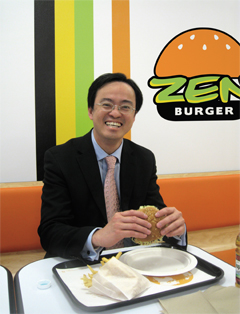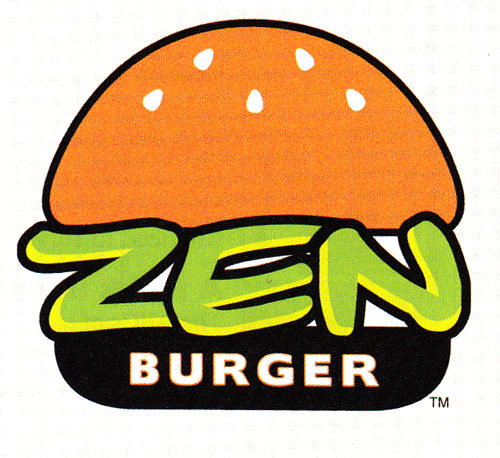Just don’t mention the phrase “right livelihood” to James Tu. The money-manager-turned-vegetarian-restaurateur shrugs off suggestions he’s engaged in anything of the kind.

“I’m trying to live ‘right living,’ but I’m just a beginner,” he protests, rattling off a list of mistakes he’s made in getting his latest venture, the Zen Burger fast-food chain, off the ground. But if we take the Buddha’s definition of right livelihood—work that causes no harm and, by extension, is consistent with wholesome values—wouldn’t Tu agree that’s what he’s engaged in? Put another way, would he say his spiritual life informs his work life? “Without a doubt,” he affirms. “I wouldn’t have done this if I didn’t have my spiritual life first.”
“This” is Tu’s company, HOV (for Healthy Original Vegetarian) Group, which sprang from his deep, abiding, and passionate belief in the power and necessity of a vegetarian way of life. Vegetarianism, for Tu, is far more than a meatless diet. “It’s critical to humanity’s survival,” he says, indicating that the crises we’re facing—environmental degradation, global warming, animal disease epidemics, and the like, not to mention food shortages and higher food costs—are attributable to, or at least exacerbated by, what it takes to put meat on our plates. And if that weren’t bad enough, there’s the spiritual cost of mass slaughtering. “If you believe in Buddhism, in reincarnation, in cause and effect, then the killing of thirty billion animals a year will come back to haunt humanity,” Tu says. “It has to be stopped.”
Still, how did Tu, a chartered financial analyst with an M.B.A. from Baruch College in New York City, go from managing assets of $350 million at Gerstein Fisher to opening a fast-food restaurant in midtown Manhattan that serves the meatless equivalent of Big Macs, popcorn shrimp, and chicken fingers? As he says, it started with his spiritual practice.
Tu, now 39, grew up Buddhist in Taiwan, but it wasn’t until college—at Tsinghua University, Taiwan’s equivalent of MIT—that he became a “real Buddhist,” as he puts it. Studying with a professor who taught a combination of Pure Land and Ch’an (the Chinese precursor of Zen), Tu practiced meditation and chanting, and struggled with becoming a vegetarian. “If you really study Buddhism, you have to be a vegetarian,” he says. “It’s a logical extension of that. But I just couldn’t get rid of meat in my life.”
Tu was also conflicted about Buddhism in general. “I was very interested in the subject, but I just didn’t feel inspired. I was studying a lot of scripture, but I couldn’t find a set of governing principles.” Perhaps a different teacher was the answer, he thought. When he came to the United States in 1989 for graduate school, he sat with Master Sheng-yen at the Ch’an Meditation Center in Queens, New York. “A great practitioner,” Tu recalls. Still, he wanted direction in applying the teachings to daily life.
After earning his master’s degree, Tu worked at a hedge fund for eight years, then shifted to financial management. “I was interested in financial markets pretty much the way I was interested in the spiritual world,” he says. “It’s about how things work.” But as his career picked up, his spiritual quest receded. “I even wrote to a friend who had studied Buddhism with me, saying I thought maybe I should focus on philanthropic growth. It seemed to be easier for me than spiritual growth.”
Then, in 1997, Tu attended a lecture on the I Ching, the ancient Book of Changes, given by a Chinese master, Henry Chang. “I was totally mesmerized,” he recalls. “Master Chang was a Christian before he was a Buddhist, and then he became a Taoist. He was able to talk about theI Ching in a very broad sense, explaining everything within the I Ching system. That was what I’d been seeking for years—a governing principle. Everything he was talking about was answering my questions.” Even more surprising to Tu: Six months later, he gave up meat without a struggle. “Taoism is a living principle. It teaches you to do what is timely, and vegetarianism is a timely issue.”
As Tu’s commitment to vegetarianism grew, he looked for related companies to invest in. He zeroed in on Worthington, at the time the only publicly traded company manufacturing vegetarian meat alternatives. Six months later, Worthington was bought by Kellogg, and Tu’s investment doubled.
But six years later, the availability of vegetarian food was still very limited; it was sold largely through health food stores and vegetarian restaurants catering to the three percent of Americans who are strict vegetarians. Tu widened his investment search to private companies he could help grow: “I wanted to help an entrepreneur develop a concept that would bring high-quality, affordable vegetarian food to the masses.” He initially rejected restaurants as unreplicable. “You can’t build a Zen Palate in every corner of the world,” he explains, referring to an iconic high-end vegetarian restaurant in New York City that he now owns. “But I heard a few friends say, ‘I think a vegetarian McDonald’s would be great,’ and I wondered how come nobody was doing it.”

He decided to do it himself. “That was a pretty bold move, because I didn’t know much about the restaurant industry, and I was at a good stage in my career on Wall Street. But I felt there was a vision inside me in terms of what I believed.” Tu had by then resumed spiritual practice and was teaching Taoism to small groups, as well as translating texts for Master Chang. (Tu’s translation of the Heart Sutra from Chinese to English, with Chang’s commentary, was privately published in 2001. He’s now working on a translation of the Tao Te Ching.)
In 2004, Tu quit his job at Gerstein Fisher, set up HOV Group, and spent the next three months in a neighborhood café, writing a business plan for the vegetarian fast-food chain. While Zen Burger was still in development, the opportunity to buy Zen Palate came up: the founders were retiring. “They wanted to close the restaurants altogether”—there are now two in Manhattan and one in Princeton, New Jersey—“but I decided to buy the company to preserve the Zen Palate brand. It has a long history and well-proven food. It’s not easy to build a brand in the vegetarian market.”
Zen Burger has set out to be the brand for the 97 percent of Americans who aren’t vegetarians. Everything from the decor—Day-Glo orange, green, and yellow—to the service is reminiscent of McDonald’s, Wendy’s, and Burger King. Deliberately so. The menu, however, is built around mock meats and fish concocted from proprietary recipes that combine vegetables, grains, and nongenetically modified soy. (There is also more conventional vegetarian fare, such as organic soups and salads.) But why go to such lengths to make vegetable-based foods look and taste like meat? “Because it’s familiar,” Tu explains. “You don’t want to change people’s behavior.”
If that sounds contradictory, what Tu means is that he’s not trying to make wholesale converts. “If we can shift just 10 or 20 percent of our diet toward vegetarian, that would make a big difference,” he says. The core Zen Burger customers are “flexitarians”—people who eat vegetarian meals a few times a week. The rest, Tu says, are just looking for a healthy meal. Not that die-hard vegetarians aren’t grateful for the new arrival. Among the customers on a recent afternoon was one woman—a vegetarian for 25 years—who had walked close to a mile just to lunch on a mock-chicken wrap. Her companion, not a vegetarian, found her Zen Burger tastier than beef and was pleased to think that if the fast-food vegetarian concept catches on, “there’ll be a lot fewer animals killed.” (She may or may not have read the tag line on the recycled-paper menu and placemat: “Zen Burger: Good for you. Good for the earth.”)
Tu’s plan is to take Zen Burger nationwide this year: he’s opening a second branch on Sunset Boulevard in Hollywood this summer and will begin offering franchises in June. He’s also introducing Fro-Zen, a line of frozen vegetarian foods under the Zen Palate label. “Access is the key,” Tu says. “Right now, ‘vegetarian lifestyle’ is so far away from what everybody does every day.”
Launching HOV and Zen Burger has meant learning the restaurant business from the ground up. Tu has made every mistake possible, he says, but the work has been his spiritual practice. “When I run into difficulties, I think, ‘I’m building this company not for myself but for a purpose.’ And miracles happen. If we can think about what’s good for the whole earth and what we can do to make a difference, we will receive a lot of help.”
Will Zen Burger be the initiative that instigates a whole movement—one that facilitates a universal shift to make people lead a more vegetarian life? “It’s not in my hands,” Tu says. “I can only do what I think should be done. Maybe someone else will see this model and feel they can do better with it. I like competition. It creates more awareness. To me, it’s about doing the best you can at this moment, given what you know now.”
Thank you for subscribing to Tricycle! As a nonprofit, we depend on readers like you to keep Buddhist teachings and practices widely available.